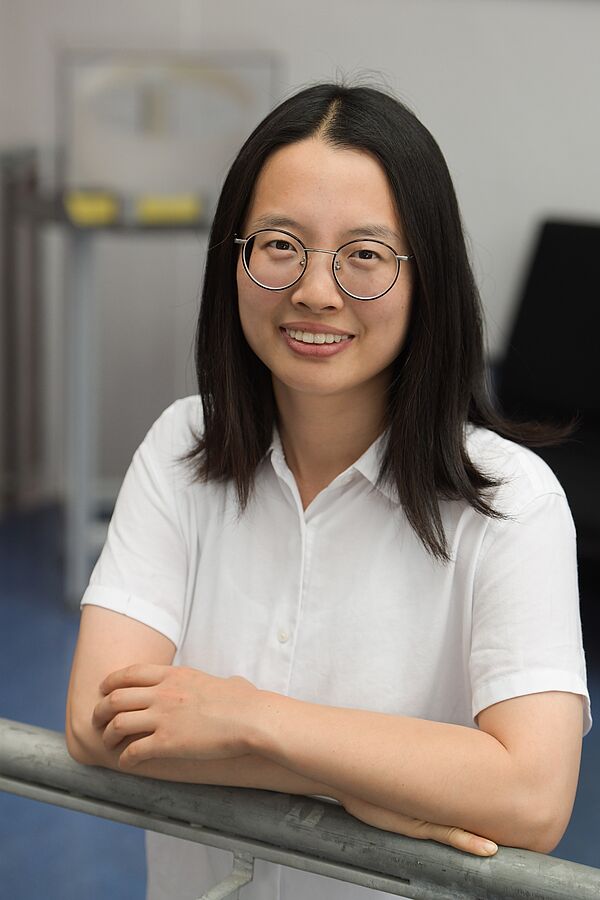0 or 1. On or Off. That is the principle on which all computers to date are based. Data has to be broken down into binary code for them to be able to compute it. But with all the new applications in autonomous driving, data-rich medicine, genomics and proteomics research, robotics, or the search for new drugs, we are giving computers increasingly complex tasks with growing volumes of data while still expecting them to work at lightning speed.
Quantum computers, which exploit the laws of modern physics, should soon live up to these expectations. Instead of the classical bits (0 or 1), they will store information in quantum bits, also known as qubits. “A qubit is capable of being in a state of both zero and one simultaneously for a certain amount of time, and infinitely many states in between,” explains Yujia Liu, a PhD student in the junior research group “Silicon-Germanium–Based Quantum Materials and Heterostructures” headed by Dr. Kevin-Peter Gradwohl. “Only when it is measured does it commit to one specific state.”
This ability, in principle, makes quantum computers much more efficient and capable of achieving enormous computing power with only a handful of qubits. In fact, even if a qubit could only be in two states at once, each qubit added to it would still double the number of states they can represent: three qubits could represent eight; 300 qubits (equalling 2300), could already represent a phenomenal 2037035976334486086268445688409378161051468393665 936250636140449354381299763336706183397376 states at the same time!
Qubits can also be linked to one another by quantum entanglement. This means that, when one qubit changes its state, all others entangled with it also change their state, and that instantaneously! There are various methods for building real qubits: one, for example, is by trapping electrons in electric fields inside layers of semiconductors and using microwaves to induce changes in state.
The crucial factor is having the right chip materials – and that is where Yujia Liu’s research comes in. Conventional computer chips are made by the Czochralski method, where a melted mass of silicon is drawn into an ingot, from which wafers are cut. Quantum computers can also be built from silicon by using higher-precision technology. “We use silicon-germanium substrates produced by chemical gas phase deposition to precipitate ultra-pure 28silicon or 28silicon-germanium layers onto them by molecular beam epitaxy at temperatures between 300 and 700 °C.” As gaseous 28silicon atoms gradually land on the hot surface, they form extremely thin, uniform layers of just a few hundred nanometers’ thickness on the substrate. “These layers must be incredibly pure so that, later on, electrons can move unhindered through the chip. Unwanted contamination would impede the mobility of the electrons,” Liu explains.
The 28-year-old Liu is from Sichuan Province in China, to the east of the Tibetan plateau, a region most famously known for its spicy hot cuisine. Liu first studied biochemical engineering at the East China University in Shanghai. Following her Bachelor’s degree, she did her Master’s degree at Ulm University in Germany, writing her thesis at the Institute of Quantum Matter. “I have always been interested in the stuff that makes up life. And, while it’s true that you can change lives with biochemistry – you can do it much faster with new materials! You can see that from the smartphones we all use every day now.” Upon arriving in Ulm, she was surprised at just how many things students in Germany have to organize by themselves. After a “stopover” at the Ferdinand-Braun-Institut, Leibniz-Institut für Höchst frequenztechnik, where she used hydride vapor phase epitaxy (HVPE) to grow and characterize thin films of aluminum nitrite, Yujia Liu came to IKZ in October 2019 to do her doctoral thesis.
What excites her about her topic of research? “I am fascinated by all the things you can do with silicon!” But there is also something else, not related to materials. “While social, political or legal norms can change relatively quickly, there are fixed rules in the natural sciences: it is easy to determine who is right and who is wrong. And you will always learn something new.” Yujia Liu’s doctoral thesis is almost finished. Where she will go from there, she has not yet decided. “Academia or industry? I’m open to both.”


